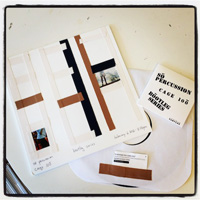Swag, Free Shows, and Feeling Slimy
A couple of weeks ago I got an entirely blank piece of vinyl in the mail. If you’re not a record-head, it means that when you set the needle, the album doesn’t make any noise for its 40 minutes of musical real estate. Entertaining, right? Mine was #59 of a limited 300-run set. The cover slip is handmade, tactile, and unique to my copy. It also came with a CD and a digital download card. I had no clue it was coming to me, much less being released. A promotion company called Dot Dot Dot Music, which specializes in neoclassical and modern composition, surprised me (and probably a hundred other music critics, bloggers, and industry folks) with the package. The intention, of course, was to get us to write about the album and subsequent tour. Well, here we are.
Palm-greasing goes hand-in-hand with the music business, and there’s not really any way around it. Often it manifests as an innocuous free album given prior to release, like that copy of Sō Percussion’s Cage 100: The Bootleg Series that showed up on my doorstep. (In case you were wondering, the blank vinyl was a nod one of Sō Percussion’s primary influences, John Cage, and his provocative composition 4’33”, which was literally four-and-a-half minutes of silence.) Other times, it manifests as VIP treatment, wining, dining, and high-stakes schmoozing. I find the line between the two—and the line between ethical and unethical music coverage—is hard to make out. I’ve stepped across it, for sure . . . sometimes on accident and sometimes on purpose.
For what it’s worth, I do actually like the Sō Percussion album. As you know, at Reviler we usually write about the music we love or the music we hate. Although we care about our readers, we don’t cater our coverage to you. (Sorry.) In this case, Dot Dot Dot sent me an album I’ve spun constantly over the past week. Cage 100 is a collection of minimal percussion, and more specifically arrangements of the work of avant-garde composer John Cage. There’s even an occasional Dan Deacon cameo. The pieces are as challenging as they were in the sixties and executed masterfully.
Also, who doesn’t love cool, free shit?
 Do I like Cage 100 even more because a music promoter thought of me and sent it along with a one-of-a-kind music artifact? I can’t really say. I’m finding it hard to judge my own objectivity, especially since I’ve begun doubting myself. I know that I’m prone to liking all things Sō Percussion. I’ve been to all of their performances in the Twin Cities in the past few years and greatly enjoyed their past eight-or-so releases. They make very difficult music accessible, collaborate with other talented musicians, and carry on a tradition of experimentalism that is out of vogue. On the other hand, I’m just as susceptible to flattery, niceties, and a burgeoning vinyl fetish.
Do I like Cage 100 even more because a music promoter thought of me and sent it along with a one-of-a-kind music artifact? I can’t really say. I’m finding it hard to judge my own objectivity, especially since I’ve begun doubting myself. I know that I’m prone to liking all things Sō Percussion. I’ve been to all of their performances in the Twin Cities in the past few years and greatly enjoyed their past eight-or-so releases. They make very difficult music accessible, collaborate with other talented musicians, and carry on a tradition of experimentalism that is out of vogue. On the other hand, I’m just as susceptible to flattery, niceties, and a burgeoning vinyl fetish.
About the same time that the LP came in the mail, a couple of friends in the local radio industry invited me to see a new UK-based pop singer, Emeli Sandé, at the Datkota Jazz Club. They had an extra ticket, a comp provided by Sandé’s publishing rep. We wound up at the same table as the rep, who put dinner and drinks for about 10 people on the label’s corporate credit account. I was being treated: all I had to do was sit through some pleasant conversation and some feel-swell music. I’m a Reviler writer; of course I couldn’t just have a good time.
The truth is, as the night wore on, I was starting to get creeped out. I felt like my opinion was being bought with free music, delicious roasted chicken, and tap beer. Is that all it takes to influence the music industry? Summit EPA?
When Sandé took the stage, my Critic-O-Meter was flashing bright red DANGER DANGER DANGER! The up-and-coming diva started off her set with hit single “Heaven,” which shifted my mood to reserved optimism. Her vocals on that song, I thought, reminded me of Light Asylum’s Shannon Funchess or a very young Etta James. “Heaven” is also the best example of what makes Sandé exciting to people: Her range is quite broad, and she can shift from the lowest blues to ecstatic wails without missing a note. She’s good at what she does. Technically, she’s near perfect. But perfection shouldn’t be premeditated.
The show wore on, and I started to hear sameness where others heard genius. Every song swung from silky verses to extravagant choruses. Up, down, up, down, up, up higher, finish. The lyrics were painfully dull, recycled tropes from golden era soul, disco, and R&B songs. Diana Ross minus Diana Ross. The Supremes minus the Supremes. Aaliyah minus Aaliyah. Regardless, the crowd hooted after every song. As Sandé bowed herself offstage, the Dakota’s patrons gave a standing ovation.
The local press doled out mostly complimentary reviews. (Of course everyone in the local press was there.) But I couldn’t hang. Was I being extra critical because I could feel music industry money gilding the evening? Would my opinion be more bright-sided if I paid the admission myself, bought my own damn chicken and beer?
As I alluded earlier, this ethical quandary isn’t new to the music industry. I was just surprised to see that the game has spread all the way from wheelers and dealers at major-market radio stations to lowly bloggers. If anything, it’s a reflection of a changing industry. It’s also a reminder: Bloggers, even if you’re not working for a website with a standard of journalistic integrity like a newspaper, watch where the swag is coming from. Yes, you must deal with the ethical shittiness as well.
One of the reasons I got into music writing was because I started to consume new bands faster than I could earn money to listen to them. I’m still grateful every time Moon Glyph or Domino sends a digital download for their new albums; I usually get around to buying a hard copy of the ones I like. I’m grateful for my neat Sō Percussion artifact and my seat at the Dakota. I’m also grateful when music promoters get to know my interests and this site’s mission. But I wish I didn’t have these occasional bouts of existential angst.
I know this isn’t exactly the coverage that Sō Percussion, their label Cantaloupe, or Dot Dot Dot PR was shooting for. Nor is it likely the reaction sought after by Emeli Sandé, EMI, or the Dakota Jazz Club. Nevertheless, they got it.
So, what does that say about them? What does that say about me? And, just as importantly, what does it say about you?
—Will Wlizlo (@willwlizlo)








“I wish I didn’t have these occasional bouts of existential angst.”
What’s the point of being a writer if you don’t? I hope that you have a lot MORE bouts. Who cares if a person can form an opinion with no external pressure? The finest critics in the land have to deal with everyone jockeying for their approval, and the ones who survive don’t lose sight of what they believe is the truth.
You can always mail back the record and turn down the guest list slots, but publicly bemoaning them isn’t going to garner a lot of sympathy from the average person who has never gotten a perk from their job. If the ultimate perk is getting to love what you write, then that will always be more appetizing than the “delicious roasted chicken.” Now you made me hungry, dude.
What are “ethics” and why isn’t this article about the brick?
Reed, welcome to the semi-occasional “Dear Diary” post on Reviler. All good points. This was especially nice to read: “the ones who survive don’t lose sight of what they believe is the truth.” My main problem (what spurred me to write this post) is that lately it seems increasingly hard (for me) to sort out what is an acceptable offering from a label/promo/distro/band from an unacceptable one. Also, you wouldn’t believe how many existential crises I have. I’m surprised I can even function.
Josh, ethics are not something innate to a spambot like you. This article is not about the Brick because the Brick is also a spambot.
Clarifications: I should mention that members of the local press (besides yours truly) WERE NOT treated to the same wining and dining from Sande’s publicist. Also, as Reed mentions in his comment, my post was slightly tone-deaf to those outside the music industry who may be jealous of the swag. I’m sorry if I sound like a mopey, petulant brat.
Great piece Will – I think that in the case of bloggers this issue is exacerbated by the fact that one feels as if the label/PR/whomever is doing you MORE of a favor than when they give similar treatment to a bigger media outlet. I.E. If Pitchfork writes something negative about the new complimentary limited edition boxset they just got, chances are there will be no repercussions because the bands/labels/PR companies need media outlets like Pitchfork. However the lowly blog that does the same thing is more likely to be cut off. I think its helpful to continually ask yourself if you would feel a certain way about an album regardless of whatever the circumstances are surrounding it. And if your honest opinion gets you “cut off” from whatever source of “swag,” then that source wasn’t interested in your opinion in the first place and probably doesn’t respect your views.
Where I (and I think a lot of local music coverage) struggle the most with this is in locals bands – I think in order to truly commit to being unbiased one has to prevent oneself from forming firenships, relationships with the local musicians you are supposed to be impartial about. Or at least make sure that those relationships have an understanding that they do not guarantee postive coverage. Of course I think it would be a bit ridiculous for us to take ourselves QUITE this seriously – but at the same time I think we (and the rest of local music media) should try and keep it in mind
4 minutes 33 seconds wasn’t a piece of silence, it was the ambient sounds of everything else going on around the venue and audience.
Of course I wouldn’t expect anything more from you, hack